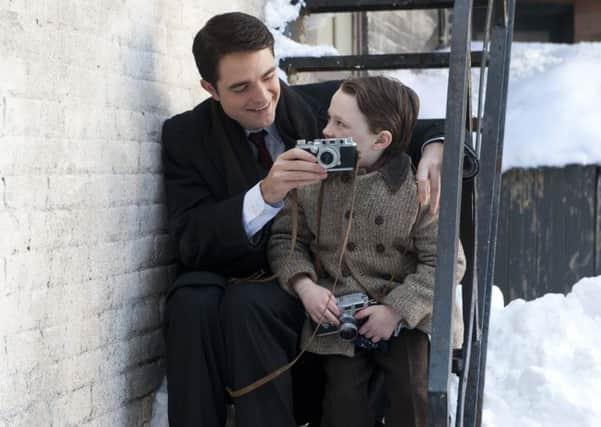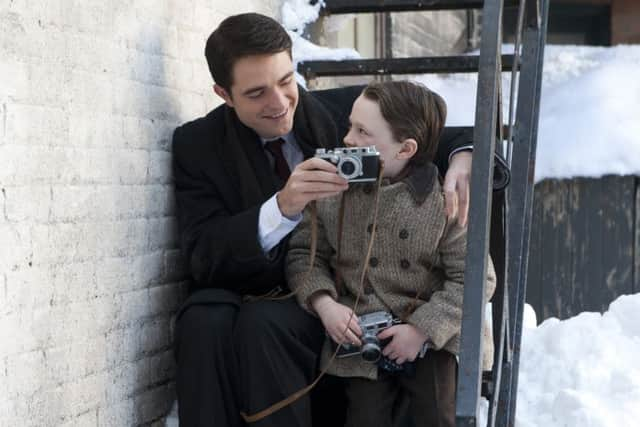Film reviews: Life | Miss You Already | Palio


Life (15) Directed by: Anton Corbijn Starring: Robert Pattinson, Dane DeHaan, Ben Kingsley, Joel Edgerton Rating: ****
Having once witnessed an about-to-break-big Robert Pattinson barely keeping his boredom in check as he yawned his way through a press conference for the first Twilight movie, it’s odd to see him on the other side of the fame equation in this dramatisation of photographer Dennis Stock’s efforts to capture the essence of James Dean before he became an icon. Life may cast Pattison against type as Stock, but his empathy for the plight of the stage-managed movie star remains clearly etched on his face as his character contemptuously plies his trade on the red carpet, all the while desperately trying to convince an already bored-with-it-all Dean that photography – like the new form of naturalistic Method acting Dean was attempting to usher in – can capture life in a more authentic way.
Advertisement
Hide AdSet in the run-up to the release of Dean’s first movie, East of Eden, the film certainly offers an intriguing portrait of the tricky relationship that exists between a photographer and their subject – particularly when said subject is torn between their own artistic proclivities and the demands of a studio intent on protecting their investment. Emerging in the wake of Marlon Brando, Dean, played here by Dane DeHaan, is presented as another mumbling roustabout only interested in making good movies and not afraid of trashing those that don’t live up to his standards. As such, he has the vague arrogance of an actor whose confidence in his own talent is accentuated by his knowledge that he’s on the verge of stardom. DaHaan – who looks enough like Dean to be convincing, but not enough to detract from his ability to get under his skin – manages to play this with the sort of wink-free subtlety that would, perhaps, have been impossible for Pattison to do now.


But having each actor play against type works in the film’s favour in other ways too. There’s an undercurrent of insecurity running through Dean that DeHaan understands: despite his obvious talent, Dean doesn’t yet have his pick of the good parts. When we first meet him, for instance, he’s in talks for Rebel Without a Cause and while the role is all but his, after an amusingly frank interview in which he pointedly refuses to stick to the PR script, he’s told in no uncertain terms by studio mogul Jack Warner (Ben Kingsley) that he needs to be a good boy if he wants the part. “If you’re not a good boy,” he’s quietly warned, “I’m gonna f*** you until it hurts.”
That insecurity manifests itself in the passive-aggressive relationship he forms with Stock, who sees something in Dean that he knows will translate into a great set of pictures. Like Dean, Stock is also at the start of his career, working for the Magnum photographic agency and slowly building his portfolio by doing publicity stills and on-set photo shoots for movie studios. “You must be a good boy if they let you on set,” mocks the actor when Stock shows him some of his work.
Unlike Dean, he has no real leverage. He might be on assignment for a multi-million-selling magazine, but deep down Stock knows he isn’t offering Dean anything that isn’t coming his way already, and Dean knows too that he’ll make Stock’s career rather than the other way around. But Stock also knows he has a chance to shape the way the world sees Dean if he can get to him first.
This anxious, antagonistic, symbiotic-but-bordering-on-parasitic relationship is nicely captured by director Anton Corbijn, who understands the medium better than most having begun his career photographing Joy Division and defining the stark aesthetic associated with frontman Ian Curtis – something Corbijn recaptured beautifully in his Curtis biopic Control. Here he shows a photographer awkwardly at work, providing context for the candid-seeming shots that ultimately appeared in Life, among them the iconic photo of Dean wrapped in his overcoat, collar up, cigarette dangling from his mouth, trudging through Time Square in the pouring rain. Naturally, these scenes avoid perpetuating the myth that great photos are randomly snapped. Corbijn shows the extent to which they require imagination, a talent for composition and an ability to use a camera to translate what you see in front of you (and what you see in your head) into an image that can capture the moment in a much deeper way.
But the film argues that such photos also require a connection to life itself and as Corbijn contrasts Dean’s relationship with his own beloved farm-belt family with Stock’s frosty relationship with his ex-wife and estranged son, the movie rejects the stereotypical idea of the selfish artist: it takes seeing Dean at ease with his family for Stock to understand what makes a true artist, allowing him in turn to loosen up enough to take the photos he needs. Dean, it seems, was a good boy where it counted.
MISS YOU ALREADY (15)
Directed by: Catherine Hardwicke
Advertisement
Hide AdStarring: Toni Collette, Drew Barrymore, Paddy Considine, Dominic Cooper
Rating: **
Terminal illness, fertility issues and a London setting that’s pure Richard Curtis prove a hellish combination in this excruciating gal-pal vehicle for Toni Collette and Drew Barrymore. Cast respectively as Milly and Jess, they play besties whose relationship hits the skids when the former is diagnosed with breast cancer and the latter’s fertility treatment finally kicks into gear. By far the needier and more self-involved of the two, PR executive Milly’s story takes up the bulk of the narrative and really sets the tone for what follows: as she tries to put a brave face on things – preparing a jolly video presentation to explain her illness to her kids, making jokes while vomiting her guts out, displaying her soon-to-be-removed breasts to a cute barman who isn’t as grossed out as her momentarily insensitive husband (Dominic Cooper) – the film adopts a similar if-you-can’t-laugh-about-it-then-cry approach, mixing moments of faux outrageous humour with moments of lachrymose sentimentality.
Advertisement
Hide AdThe latter mostly come as the film runs through the big milestones of the disease – Milly getting her diagnosis, Milly losing her hair, Milly going off the rails – but the script also piles on unearned moments of shameful heartstring-tugging by having Jess repeatedly come to her aid, often at the expense of her own relationship and health once she’s pregnant. That it never really establishes why they’re such great friends – beyond a few tossed off anecdotal references to their crazy college days – doesn’t help matters. Nor does a subplot involving Milly’s actress mother (Jacqueline Bisset), whose vacuous nature is supposed to explain why she’s a little messed up. Indeed everything feels a bit tacked on, like someone playing Pin the Tail on the Donkey with the constituent parts of a Richard Curtis script.
To this end, the big moment of crisis comes when the newly pregnant Jess has complications that force her to take more of a backseat role in crisis-managing Milly’s life, but the pregnancy is really just an excuse to have a crazy dash-to-the-hospital ending. It’s a disappointing effort from director Catherine Hardwicke given her pedigree. Having wrestled the first Twilight book into a workable movie and made one of the best teen dramas of recent years in Thirteen, she’s capable of much better filmmaking than this. Alas, she seems a little lost here, as if she doesn’t quite know how to handle Morwena Banks’ script, which embraces all the usual naff conventions of mainstream British comedies without giving Collette or Barrymore anything particularly spiky or entertaining to play with beyond cheap melodrama and broad gags about British rudeness. And giving Dominic Cooper and Paddy Considine redundant husband roles hardly counts as redressing the gross gender imbalance in movies when the main characters are just as insipid.
Palio (12A)
Directed by: Cosima Spender
Rating: ****
Run twice a summer in Siena, Italy, the Palio is one of the more bizarre European sporting spectacles on the calendar – mainly because this 90-second horse race round Siena’s town square isn’t particularly sporting.
Despite looking like a short, sharp, brutal piece of extreme sports, below, it’s also a hotbed of open corruption in which locals get as caught up in the behind-the-scenes deals and the complex system of strategising that goes into each event as they do the actual race. Cosima Spender’s film delves into this bizarre world, giving a flavour of the surrounding pageantry (which bears an odd resemblance to The Hunger Games), but mostly concentrating on the precarious relationship that exists between the jockeys and the districts – or contrada – for which they ride.
In the process she tries to get a handle on the attendant scheming that makes the Palio more of a game than a race. And what a strange game it is: riders whip each other mid-race with dried ox penises, rival districts within the city get into fights with one another, and the jockeys – who have no real loyalty to the contrada – frequently require protection from the public (they’ve been known to attack jockeys the moment the race is over if things don’t go according to plan). Spender assembles a good mix of veterans who fill us in on the changing nature of the Palio, particularly as it has become more of a professional event ever the last 20 years of so. But she lucks out too by zeroing in on two jockeys – long-running Palio champ Gigi Bruschelli and his former protégé Giovani Atzeni – whose opposing approaches to the Palio and motivations for participating provide a classic sports movie narrative.
Mia Madre (15)
Directed by: Nanni Moretti
Starring: John Turturro, Margherita Buy, Giulia Lazzarini
Rating: ***
As an egotistical American movie star newly arrived in Italy to shoot a hard-hitting social realist drama, John Turturro has lot of fun in this latest effort from Nanni Moretti, particularly as his character, the wonderfully named Barry Huggins, starts to have a detrimental effect on the production. Bragging about having once worked with Kubrick (which he clearly hasn’t), but unable to get his Italian lines right, Barry really tests the patience of his director, Margherita (Margherita Buy), who’s trying to hold the production together while caring for her dying mother (Giulia Lazzarini). Moretti, who also co-stars as Margherita’s more together older brother, is good when he’s sending up the self-importance of the film industry, but as he lurches into sincere mode to show how life and art feed into each other, things get a little treacly.
Captive (12A)
Directed by: Jerry Jameson
Advertisement
Hide AdStarring: David Oyelowo, Kate Mara, Michael Kenneth Williams
Rating: *
Based on a dubious-sounding true story, this rancid thriller gradually reveals itself to be something of a plug for a Christian-themed self-help book called The Purpose Driven Life, written by an American celebrity pastor by the name of Rick Warren. The way the film tells it, this tome apparently got the film’s real life heroine, Ashley Smith (Kate Mara), through the terrible ordeal of being a crystal-meth-addicted single mother who ended up being held prisoner by escaped convict Brian Nichols (David Oyelowo) after he went on a killing spree in Atlanta, Georgia in 2005. The tragic facts of Nichols’ rampage – he killed four people and left a prison guard in a coma – aren’t in dispute, but the rest of this comes across as hokey nonsense designed to celebrate the power of piety.